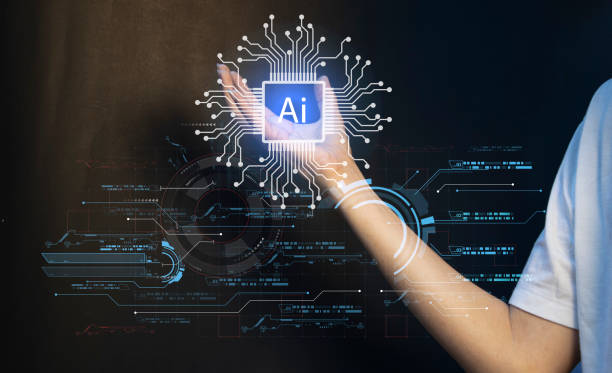What is Artificial Intelligence? Definition and Basic Concepts

#Artificial_Intelligence (AI) is a branch of computer science that deals with creating machines capable of performing tasks that typically require human intelligence.
These tasks include learning, reasoning, problem-solving, language comprehension, pattern recognition, and decision-making.
In other words, AI strives to create systems that can think and act like humans.
AI is not limited to a specific technology, but rather a collection of techniques and algorithms developed with the goal of creating intelligent systems.
Artificial Intelligence, Machine Learning, and Deep Learning are related concepts, but they have differences.
Machine Learning is a subset of AI that allows systems to learn from data without explicit programming.
Deep Learning is also a subset of Machine Learning that uses artificial neural networks with multiple layers to analyze data.
In fact, deep learning is one of the most powerful techniques available in the field of artificial intelligence, having provided performance beyond traditional methods in many applications.
Did you know that 94% of a company’s first impression is related to its website design?
Rasawb helps you create the best first impression by offering professional corporate website design services.
✅ Creating a professional and trustworthy image for your brand
✅ Easier attraction of potential customers and improvement of online presence
⚡ Get free corporate website design consultation
History of Artificial Intelligence, From Idea to Reality

The history of Artificial Intelligence dates back to the 1950s.
Alan Turing, a mathematician and computer scientist, published an article titled ‘Computing Machinery and Intelligence’ in 1950, in which he referred to the possibility of building machines with human intelligence.
This article can be considered a turning point in the formation of artificial intelligence.
In the 1960s and 1970s, initial research in artificial intelligence was pursued with great enthusiasm.
Researchers tried to create systems that could solve mathematical problems, understand natural language, and play games like chess.
However, progress during this period faced limitations.
Lack of computational power and insufficient training data prevented the realization of many early goals.
In the 1980s and 1990s, artificial intelligence experienced a period of stagnation.
However, with the advancement of technology and increased computational power, artificial intelligence gained attention again.
The emergence of new algorithms such as neural networks and machine learning marked a new chapter in the history of artificial intelligence.
Today, artificial intelligence is applied in many fields and is rapidly advancing.
Types of Artificial Intelligence, From Narrow AI to General AI

Artificial intelligence can be divided into several categories based on capabilities and performance.
One of these classifications is the distinction between Narrow AI and General AI.
Narrow AI, also known as Weak AI, is designed to perform specific tasks and performs well within that domain.
For example, facial recognition systems, voice assistants, and product recommendation algorithms are all examples of Narrow AI.
These systems are very skilled at their tasks but cannot operate beyond their defined scope.
In contrast, General AI, also known as Strong AI, refers to a system that can perform any intellectual task that a human is capable of.
General AI is still in the early stages of development and has not yet been fully realized.
The idea of General AI is to create a machine that can think, learn, and solve problems like a human.
In addition to these two categories, there is another category called Super AI.
Super AI refers to a system that surpasses human intelligence and capabilities.
This type of artificial intelligence is still a theoretical concept and does not currently exist.
| Type of Artificial Intelligence | Description |
|---|---|
| Narrow AI | Focused on performing specific tasks |
| General AI | Ability to perform any intellectual task like a human |
| Capability | Example |
|---|---|
| Facial Recognition | Security Systems |
| Natural Language Processing | Voice Assistants |
Applications of Artificial Intelligence in Daily Life

Artificial intelligence has increasingly permeated our daily lives.
From voice assistants like Siri and Alexa to movie and music recommendation systems, AI is changing how we interact with technology.
In the medical field, AI helps doctors diagnose diseases, design effective treatments, and predict treatment outcomes.
In the transportation industry, self-driving cars and traffic management systems are examples of AI applications.
In the financial sector, AI is used for fraud detection, risk management, and providing personalized financial services.
AI also has widespread applications in education, marketing, manufacturing, and many other industries.
Overall, AI has the potential to improve our lives and increase the efficiency of many processes.
However, the use of AI also comes with challenges that need to be addressed.
Artificial Intelligence (AI) has the potential to improve our lives and increase the efficiency of many processes.
Are you concerned about your e-commerce website’s low conversion rate and not achieving your desired sales?
Rasawb is your specialized solution for a successful e-commerce website.
✅ Significant increase in conversion rate and sales
✅ Professional and user-friendly design to attract customer satisfaction
⚡ Act now to get a free website design consultation!
Machine Learning and Deep Learning, Two Main Pillars of Artificial Intelligence

Machine learning and deep learning are two key techniques in artificial intelligence.
Machine learning enables systems to learn from data and improve their performance without explicit programming.
Machine learning algorithms can identify patterns in data and use these patterns for prediction or decision-making.
Deep learning is a subset of machine learning that uses artificial neural networks with multiple layers to analyze data.
Deep neural networks are capable of learning complex patterns in data and, in many applications, provide performance beyond traditional machine learning methods.
Deep learning has achieved significant successes in areas such as image recognition, natural language processing, and machine translation.
Both machine learning and deep learning techniques play an important role in the advancement of artificial intelligence, enabling intelligent systems to automatically learn from data and make better decisions.
Challenges and Limitations of Artificial Intelligence

Despite significant advances in artificial intelligence, there are still challenges and limitations that need to be addressed.
One of the main challenges is the scarcity of training data.
Machine learning and deep learning algorithms require large amounts of training data to learn and perform well.
In many cases, access to sufficient and high-quality data is a major challenge.
Another challenge is the interpretability of AI models.
Many deep learning models, especially deep neural networks, act like a black box, and understanding how they arrived at a particular result is difficult.
This can be problematic in some applications, such as medical diagnosis.
Also, issues related to data privacy and security are among the important challenges in the field of artificial intelligence.
The use of personal data to train AI models can create risks to individual privacy.
Furthermore, the potential misuse of AI for malicious purposes, such as creating autonomous weapons, is a serious concern.
Artificial intelligence is a powerful technology that can have many benefits, but it must be used cautiously and responsibly.
Impact of Artificial Intelligence on the Future of Jobs and the Labor Market

Artificial intelligence has the potential to significantly impact the future of jobs and the labor market.
Some jobs will be completely replaced by AI and automation, while other jobs will change and require new skills.
Jobs involving repetitive and routine tasks are most vulnerable to automation.
However, jobs requiring creativity, critical thinking, and social skills are less at risk of replacement.
AI can also create new job opportunities.
The development, implementation, and maintenance of AI systems require skilled professionals in fields such as computer science, statistics, and mathematics.
Furthermore, with the expansion of AI applications, new job opportunities will emerge in areas such as AI ethics, AI law, and AI user experience design.
To prepare for the future labor market, individuals must keep their skills updated and continue learning new ones.
Artificial intelligence is a powerful force that can transform the job market, but with proper planning and preparation, the opportunities created by it can be leveraged.
| Impact | Description |
|---|---|
| Automation | Replacing repetitive jobs with AI systems |
| Job Creation | Need for specialists in AI-related fields |
| Required Skill | Description |
|---|---|
| Data Analysis | Ability to interpret and use big data |
| Creativity | Creating innovative solutions using AI |
Ethics in Artificial Intelligence, Ensuring Responsible Use of Technology

With the expansion of Artificial Intelligence applications, issues related to ethics in AI are becoming more important.
AI algorithms can introduce bias and discrimination into decision-making if their training data is biased.
For example, facial recognition systems may have lower accuracy in recognizing faces of individuals with darker skin tones.
To prevent these problems, we must actively identify and eliminate bias in AI data and algorithms.
Another issue is accountability for decisions made by artificial intelligence.
If a self-driving car causes an accident, who will be responsible? The car manufacturer, the software developer, or the car owner? Determining responsibility in these cases is a legal and ethical challenge.
Also, we must pay attention to the issue of privacy in artificial intelligence.
The use of personal data for training AI models must comply with ethical and legal principles.
Ethics in artificial intelligence is an important area that must be addressed to ensure the responsible and fair use of this technology.
Artificial intelligence is a powerful force that can benefit society, but it must be used in compliance with ethical principles.
Are you concerned about your e-commerce website’s low conversion rate and not achieving your desired sales?
Rasawb is your specialized solution for a successful e-commerce website.
✅ Significant increase in conversion rate and sales
✅ Professional and user-friendly design to attract customer satisfaction
⚡ Ready for a revolution in online sales? Get a free consultation!
The Future of Artificial Intelligence, Predictions and Probabilities

Predicting the future of Artificial Intelligence is difficult, but based on current trends and advancements, some probabilities can be discussed.
It is expected that AI will make significant progress in various fields in the future.
In the medical field, AI can help with faster and more accurate disease diagnosis, personalized treatment design, and new drug development.
In the transportation industry, self-driving cars can lead to a reduction in accidents, improved traffic flow, and reduced air pollution.
In the financial sector, AI can help with fraud detection, risk management, and providing personalized financial services.
Furthermore, it is expected that AI will find broader applications in fields such as education, marketing, manufacturing, and many other industries.
However, we must also pay attention to the potential challenges and risks of artificial intelligence.
Issues related to ethics, privacy, security, and the impact of AI on the labor market must be seriously considered.
Artificial intelligence is a powerful technology that can shape our future, but it must be used cautiously and responsibly.
How to Learn Artificial Intelligence? Resources and Learning Paths

If you are interested in learning artificial intelligence, there are various resources and learning paths you can use.
One way to learn AI is to enroll in online courses.
Websites like Coursera, edX, and Udacity offer a variety of courses in artificial intelligence, machine learning, and deep learning.
These courses typically include video lectures, exercises, and projects, helping you learn basic concepts and strengthen your practical skills.
Another way to learn AI is by studying books and scientific articles.
There are many books on artificial intelligence that you can use to learn basic and advanced concepts.
You can also read scientific articles in reputable journals to stay informed about the latest advancements in AI.
Additionally, you can enhance your AI skills by participating in practical projects.
Participating in open-source projects, collaborating with research teams, and joining AI competitions are excellent opportunities for practical learning and gaining experience.
To start learning Artificial Intelligence, you can begin by learning programming languages like Python and R.
These languages are powerful tools for developing and implementing AI algorithms.
Frequently Asked Questions
| Question | Answer |
|---|---|
| What is the definition of Artificial Intelligence (AI)? | It is a field in computer science that aims to create intelligent machines capable of thinking, learning, problem-solving, and decision-making like humans. |
| Mention some common AI applications. | These include self-driving cars, voice assistants (like Siri and Alexa), recommendation systems (like Netflix and Amazon), facial recognition, and medical diagnosis. |
| What is the difference between Narrow AI (ANI) and General AI (AGI)? | Narrow AI specializes in a single, specific task, while General AI possesses human intellectual ability to perform any cognitive task. |
| What is Machine Learning and its relationship to Artificial Intelligence? | Machine Learning is a branch of Artificial Intelligence that focuses on developing algorithms that allow systems to learn from data without explicit programming. |
| What are Artificial Neural Networks? | They are computational models inspired by the structure and function of the human brain, used in deep learning to process data and discover complex patterns. |
| Mention some ethical challenges related to Artificial Intelligence. | These include privacy issues, bias in data and algorithms, job displacement, and accountability in the event of errors or unfair decisions. |
| What is Natural Language Processing (NLP)? | It is a branch of Artificial Intelligence that focuses on enabling computers to understand, interpret, and generate human language in a useful and interactive way. |
| How can Artificial Intelligence affect the labor market? | It can lead to the automation of some routine tasks, requiring retraining of workers and creating new jobs in areas of designing, developing, and maintaining AI systems. |
| What is Computer Vision? | It is a field in Artificial Intelligence that enables computers to “see,” understand, and interpret images and video in the same way humans do, allowing them to recognize objects and faces. |
| What is the importance of data in developing Artificial Intelligence systems? | Data is the fuel that powers Artificial Intelligence systems, especially in machine learning. The quality and quantity of data significantly affect the accuracy and performance of models and their ability to learn and make correct decisions. |
And other services of Rasawb Advertising Agency in the field of advertising
- Smart UI/UX: A fast and efficient solution for online growth focusing on SEO-driven content strategy.
- Smart Conversion Rate Optimization: A specialized service for online growth based on an SEO-driven content strategy.
- Smart Sales Automation: An innovative platform for improving customer behavior analysis with attractive UI design.
- Smart Digital Branding: A professional solution for customer behavior analysis with a focus on SEO-driven content strategy.
- Smart Conversion Rate Optimization: An effective tool for improving SEO ranking by optimizing key pages.
And over hundreds of other services in the field of internet advertising, advertising consultation, and organizational solutions
Internet Advertising | Advertising Strategy | Advertorials
Sources
Comprehensive AI Guide on Digikala Mag
Latest AI News on IRNA
Practical Applications of AI on ISNA
Future Outlook of AI on Tasnim
? Are you ready to take your business to the top? Rasawb Afarin Digital Marketing Agency, specializing in SEO, content marketing, and multilingual website design, paves your path to digital success.
📍 Tehran, Mirdamad Street, next to the Central Bank, South Kazeroun Alley, Ramin Alley, No. 6




